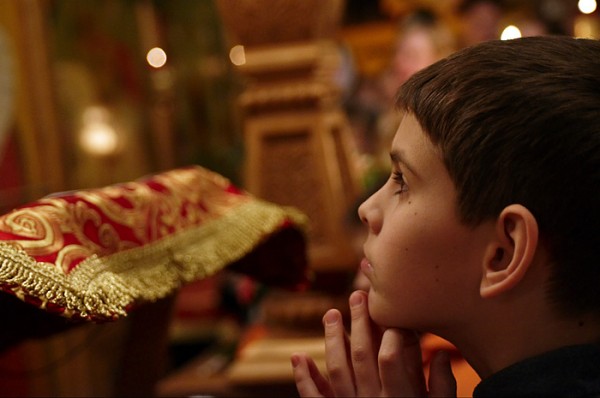“‘Love the Lord your God with all your heart and with all your soul and with all your mind.’ This is the first and greatest commandment. And the second is like it: ‘Love your neighbor as yourself.’ All the Law and the Prophets hang on these two commandments.”
We all know, we quote these words of our Lord, we make sermons based on these words. We know that there should be no difference between our behavior towards God and towards others. In reality, loving others is more important from the perspective of knowing we have faith or not, since there is no way to prove how sincerely we love God because visibly we cannot deal directly with Him. If our communion with God is real then there is no way other than that communion’s fruit will be our love to our brothers and sisters. That’s where Jesus’ words of similarity of loving God and loving others are coming from. We cannot love God and not love others. That is impossible. I will go forward and say something that some Christians may question and that is if someone is a non-believer but loves others, if he acts as a real caring human being toward others, then that person also loves God, even though he thinks that there is no God. In this case, God is in his soul, he simply doesn’t recognize Him. Such a person indeed acts and lives like a Christian, although he may not confess that. I’ve got to know such people.
Despite all of this not all of us, Christians, get this basic truth of our religion, that faith in God is the same as loving others. Indeed, sometimes we separate God from man. We act like we are pretending to be believers, but pay little attention to our relations to our brothers and sisters. Going to Church and following the rules with no real sincere motivation doesn’t show any proof of our faith and may become shameful hypocrisy. Many may disagree with me, but I am not talking here about what we say or even what we think. I am talking about how our behavior ends up in reality regarding this issue.
“I said, ‘You are “gods”; you are all sons of the Most High”, Psalm 82. We carry God’s image and likeness. We are imperfect gods, and there is the other side of this reality and that God is a perfect man. According to Russian Christian philosopher Berdyaev, there is a deep humanity in God as divinity within us. We always have to remember this very deep interrelationship between God and man. God by His incarnation, by becoming a human being through Jesus Christ, opened new things to us that were unapproachable before. He broke the distance between God and man, he established an equal relationship between God and man, between the Perfect and imperfect, between purity and sin. We are the only creatures to whom God gave His nature and that is why He cares so much about us, because we are of the same nature with God, because we are His children, because we are “gods”. The history of Revelation recorded in the Bible but not limited to, shows that God’s main concern is humanity. The Bible is about God’s communication to us in order to show us what real happiness is.
What do we think of happiness? What is our understanding of eternal life and the Kingdom of God? And finally how do we understand Jesus’ words that the Kingdom of God is in our midst? Jesus’ words are not only for the time being. Jesus’ words are eternal; His words are for all times and addressed to each one of us. So what does the Kingdom of God in our midst mean? What is real happiness?
“For whoever does not love their brother and sister, whom they have seen, cannot love God, whom they have not seen”, these words are also well known from John the Disciple’s first letter. How we can prove our love towards God? I think the only way to prove that love is when we prove our love to our brothers and sisters and that requires sacrifices, and sometimes big sacrifices, sacrifices that can seriously hurt us.
I heard some non-believers saying: “Why do I have to carry burdens of the others?” Many will say this is wrong and it is. I have also seen other non-believers who are caring individuals. But it is shocking to see some Christians acting in the same way as the first group of non-believers mentioned above. Such Christians won’t say this openly, but their acts will have the same implications as the words of the first group of non-believers. While it is easy to follow religion’s rules, it is difficult to make sacrifices that may hurt us, sacrifices that are necessary to help others. That’s why being a Christian and a decent human being is difficult. It is about overcoming ourselves, our weaknesses, and overcoming of our care about what other people think about us more than following the truth, God’s Truth. I have seen people criticizing others and making fun of them because these people were trying helping someone in need. That is shocking. That is coming from the wrong understanding of faith and thinking it is only about God while it is about God and man at the same time. To be more correct, that is coming from a lack in faith, a lack of real every moment communion to God, a reality that leaves no other chance for someone who experiences such communion to have also a real love towards others and accordingly to help and to show mercy. When someone is knocking our door for help, the minimum that we have to do is to listen carefully, look at the case and find out whether it is legitimate or fake and accordingly make a decision to help or not. We cannot send anyone away from the first moment when there is a request for help. That is completely inhuman and unchristian and any attempt to justify such behavior is unacceptable. It is truly said by Russian great writer Leo Tolstoy: “A drop of kindness is better than a barrel of philosophy”.
What makes Christianity unique is God’s sacrifice for us, since God limited Himself, His power and glory and became a human being like each one of us (what an honor), and most importantly while He was completely innocent he was persecuted, betrayed, mocked, tortured and crucified for us, His children. His death was so painful, humiliating and extraordinary because according to the Roman rules someone should be punished either by flogging or by death. Both ways of punishment were not implemented to the same person at the same time. If someone got flogged there was no execution and vice versa. Pilate thought to limit Jesus’ punishment by only flogging Him, but it ended up that Jesus was both flogged and crucified. It is amazing to see that even Jesus had a difficult time to face torture and death as He prayed right before He was taken: “My Father, if it is possible, may this cup be taken from me”, but that was for a very short moment and He continued: ”Yet not as I will, but as you will”. Really, it is not easy. In reality, few of us face the challenge of being tortured and killed as Jesus did. We have seen such things recently in the Middle East where Christians were martyred for their faith. Here in the US, it is mostly about much easier sacrifices, way easier.
Actually, I think we need an earthquake. We are sleeping. Apparently, a comfortable life is hardening our hearts. We are becoming indifferent to our brothers and sisters. Sometimes we think that if someone is in trouble, then that is his/her fault and he/she deserves it. Well. That is unchristian. We have to remember what Jesus did when they brought to him a sinner woman who according to the law was required to be stoned. He forgave her, but also He said:” Sin no more”. We should not judge someone for his/her mistakes and sins but show mercy and help. Punishment in Christianity is the last option when all others means and methods fail to fix someone and if that person arrogantly continues his/her wrong way and negatively affects others. There is a long way of showing mercy, compassion, forgiveness before thinking of punishment.
There are two kinds of people. First, people who live and are concerned only about themselves. These are the majority. The second kind who are in minority; people who despite natural self-care instinct, live for others and accordingly make sacrifices in order to help people in need. Anyone who has an understanding that happiness is in helping others and making them happy is blessed and such an individual is an accomplished high-value human being.
We talk of everyday Christianity, of 24/7 Christianity, and when somebody comes and knocks our door, he/she is not only that person, in reality, he/she is Jesus, we meet Jesus in suffering and needy people, that where Jesus is. But that is not the whole story. By helping others we become Jesus’ instrument, we become Jesus to people in need. In order for that to happen, we have to allow that by our free will, we voluntarily make a commitment of helping others despite how difficult that could be.
God is Love, unconditional Love. The Kingdom of God is to live in God’s Love, in an environment of eternal tranquility. If we can create moments of similar Love by our sacrifices for others while we are still living in the world, that’s how we cleanse ourselves and become higher value individuals. That’s how we can taste real happiness and most importantly that’s how we can accomplish Jesus’ words of the Kingdom of God being in our midst.
Fr. Bedros Shetilian was born in Aleppo, Syria, in 1963. After high school, he moved to Armenia and then to Russia to pursue a musical education and graduated from St. Petersburg Conservatory with a master’s degree in symphony conducting. Between 1992 and 2003 he successfully worked as a conductor, with concerts in Russia, Armenia, and Europe. Fr. Shetilian attended the Catholic College in St. Petersburg and the Seminary of the Catholicosate of Cilicia in Lebanon. He was ordained as a married priest in 2003. Afterward, he was assigned to serve in the US. Since 2005, he has been the priest in residence at St. Gregory the Illuminator Armenian Apostolic (Orthodox) Church in Springfield, Massachusetts. Fr. Shetilian continues to combine both his callings as a clergyman and a musician.
















